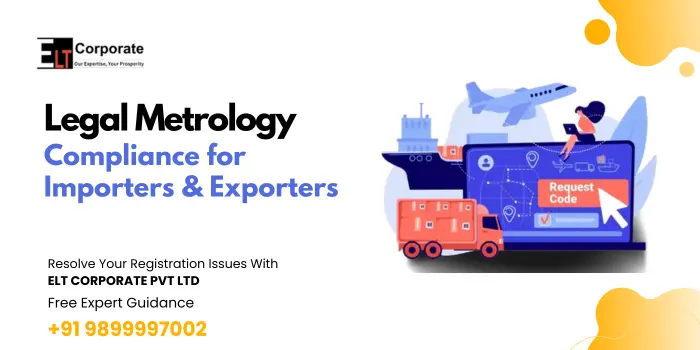Legal Metrology compliance for importers and exporters is an important requirement for businesses involved in international trade. In India, the Legal Metrology Act, 2009, and the Packaged Commodities Rules, 2011 make it compulsory for importers and exporters to ensure that all weights, measures, and packaging of goods are accurate, transparent, and properly declared. For importers, registering under Legal Metrology, getting LMPC certificates, and making proper labeling before the products reach the Indian market are required. For exporters, compliance ensures that products meet international packaging and measurement standards, avoiding rejection in foreign markets.
Ignoring Legal Metrology compliance for importers and exporters can result in heavy fines, seizure of goods, cancellation of licenses, and loss of business credibility.
Why Is Legal Metrology Compliance Important for Importers and Exporters?
- Protects Consumer Rights – Ensures fair trade by providing accurate weight, measure, and MRP.
- Prevents Penalties – Non-compliance can lead to fines, seizure of shipments, and legal action.
- Smooth Customs Clearance – Proper compliance helps in the quick clearance of goods at ports.
- Builds Business Trust – Compliant businesses gain the trust of consumers and global partners.
- Supports International Trade – Exporters avoid rejection of shipments by following packaging norms.
What Are the Legal Metrology Requirements for Importers?
Importers of pre-packaged goods must follow these key rules:
| S.No. | Requirement | Details |
|---|---|---|
| 1. | LMPC Registration (Importer) | Mandatory before importing any packaged goods into India. |
| 2. | Declarations on Labels | Net quantity, MRP, country of origin, packer/importer details. |
| 3. | Use of Certified Weighing Devices | All measurements must be verified and stamped. |
| 4. | Record Keeping | Maintain invoices, import documents, and declarations. |
| 5. | Renewal of Registration | Renew LMPC certificate as per the rules. |
What Are the Legal Metrology Requirements for Exporters?
Exporters must comply with both Indian rules and the requirements of the importing country:
| S.No. | Requirement | Details |
|---|---|---|
| 1. | Proper Packaging | Ensure weights and measures meet Indian standards. |
| 2. | Declarations for Foreign Buyers | Labels must show net quantity, batch, and expiry date. |
| 3. | Country-Specific Standards | Must follow the legal metrology rules of the destination country. |
| 4. | Certificate of Compliance | Exporters may need certification for customs clearance abroad. |
| 5. | Record Maintenance | Maintain export documents and declarations. |
What Are the Consequences of Non-Compliance?
Here in this table you can check the consequences of non-compliance:
| S.No. | Non-Compliance Issue | Possible Consequence |
|---|---|---|
| 1. | Import without LMPC Certificate | Goods may be stopped at the port, and heavy fines imposed. |
| 2. | Wrong or Missing Labeling | Seizure of products, penalties up to ₹25,000. |
| 3. | Non-verified Weighing Instruments | Cancellation of the license and business loss. |
| 4. | Repeated Offences | Higher fines, imprisonment, and export rejection. |
Difference Between Importer vs Exporter Compliance
Check out this table to understand sthe difference between importer vs exporter compliance:
| S.No. | Aspect | Importer Cimpliance | Exporter Compliance |
|---|---|---|---|
| 1. | Registration Needed | LMPC Certificate is mandatory before importing goods | Not required, but must follow foreign regulations |
| 2. | Label Declarations | MRP, country of origin, importer/packer details | Net quantity, batch, expiry, buyer-specific info |
| 3. | Risk of Non-Compliance | Goods stopped at the port, heavy fines, and product seizure | Shipment rejection, loss of credibility abroad |
How Can Importers and Exporters Stay Compliant?
- Apply for LMPC Registration before importing or exporting goods.
- Ensure Accurate labelling with all mandatory declarations.
- Use Certified Measuring Instruments verified by Legal Metrology authorities.
- Renew Licenses and Certificates on time to avoid penalties.
- Train Staff to follow packaging and labelling compliance rules.
How long does it take to get LMPC Registration?
It usually takes 3–4 weeks, depending on the state Legal Metrology department and the completeness of documents.
How Can ELT Corporate Help With Legal Metrology Compliance for Importers and Exporters?
ELT Corporate specialises in Legal Metrology compliance for importers and exporters and provides complete support to businesses dealing with packaged goods.
- Assistance in LMPC Registration for importers
- Compliance checks for exporters as per international rules
- Label review and design support to meet Legal Metrology norms
- End-to-end application support on the Legal Metrology portal
- Handling inspections, queries, and notices from authorities
- Renewal and modification of licenses
- Staff training for compliance awareness
Is LMPC Registration Mandatory for Importers in India?
Yes, every importer of pre-packaged goods must obtain an LMPC certificate.
What Happens if Goods are Imported without LMPC Registration?
Goods may be seized at customs, and importers may face heavy penalties.
Can ELT Corporate help with both import and export compliance?
Yes, ELT Corporate provides complete compliance support for both importers and exporters.








